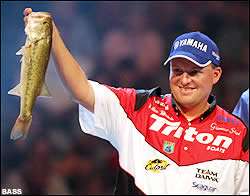
CELEBRATION, Fla. — At just 28 years old, Dustin Wilks is familiar with being one of the youngest guys in the field — and dealing with the challenges that come with it.
But the professional bass angler from Raleigh, N.C., is using his age to his advantage, devoting his time, nearly endless energy and competitive spirit to compete with more-established — and older — anglers in the 2006 CITGO Bassmaster Elite Series.
"I meet people of all age ranges who want to get into it," said Wilks. "It's tougher for a guy who's a teenager, who doesn't have any work experience, to get a boat and truck and try to make a tournament."
Wilks was still in college at North Carolina State University when he entered his first BASS tournament in 1997. In his second tournament one year later, he finished third and won a boat, spurring him on to complete his education and join the CITGO Bassmaster Tour on a full-time basis.
About eight years later, Wilks has yet to win a BASS tournament. But he's finished third in three events and qualified for the CITGO Bassmaster Classic four times. He is generally regarded as a star on the rise, making his participation in the all-new Elite Series a natural part of his career progression.
The Bassmaster Elite Series is limited to approximately 100 of the best anglers in the world and pays out more than nearly $7.5 million in cash over 11 prestigious tournaments. Additionally, anglers who fish the Series have the opportunity for unprecedented exposure and coverage on same-day and taped telecasts on ESPN networks, as well as other print and electronic media.
"The opportunity to promote our own sponsors was very important to me," said Wilks, whose backers include Skeeter Boats, Yamaha motors, Team Daiwa rods, reels and lures, Culprit soft plastics and Keelshield keel protectors. "The fact that in all of the media stuff, the magazine, the Web site … they're not scared to put something up there that's a competing sponsor. It gives us the chance to make a living and the opportunity is there with BASS."
Like other anglers, Wilks also is pleased with the Elite Series schedule, which begins with the "Battle on the Border" at Lake Amistad in Del Rio, Texas, March 9-12, and visits many of the top bass fishing destinations in the country.
"I think ultimately it will get better for fishing and the show," he said. "There will be more fish caught, and more big fish makes a better show."
Wilks, whose father and grandfather were engineers, earned a degree in fisheries sciences at North Carolina State and said his education has helped his career. "Taking Chemistry 101 didn't help me be better at bass fishing," he said. "But fishing helped me through school because I was interested in the topics. It helps to have that college education. You can meet and carry on an intelligent conversation with a lot of people on a lot of topics."
But Wilks did credit a course he took in Limnology, the study of lakes, rivers and streams, for helping his career. "That course taught me a lot about water, including the properties of water down to the microscopic level. It really correlated with fishing. The first test, I got like a 98, and everybody else failed. I liked that course a lot."
He will continue applying what he has learned as he seeks that elusive first BASS win in the coming season. "I've always fished BASS," he said. "Everybody who makes a living in the sport who I look up to has made a living in BASS, and that's the place to be."
